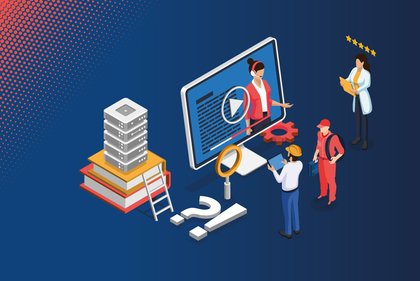Industry 4.0 - Reality and not just a Vision
The first industrial revolution achieved the first industrial boom through to the use of hydraulic, steam and coal-fired power. Whereas the second was affected by electricity and the work on assembly lines. The third industrial revolution has its focus on IT and electronics. Digitalisation and networking of machines take form in "Industry 4.0".
What does Industry 4.0 mean?
Industry 4.0 effects machines to realize on their own, if a new spare part is needed. The machine identifies the spare part in an intelligent spare parts catalogue and informs the customer or directly reports to the manufacturer. Now the customer or manufacturer has all the necessary information to initiate a service order. To kick this example up a notch, it is now possible for a machine to detect a soon to be defected part before any downtime. It is able to order the needed spare part independently in an intelligent spare parts catalogue with shop function even before the wear and tear and to initiate a service order. The behaviour for repair and maintenance is similar.
This scenario is not futuristic! With the spare parts catalog software of Quanos Service Solutions and the right data these processes already work today.
Service Information System - Data Supplier for Industry 4.0
An intelligent networking is not almost impossible without data and information. This is where Quanos Service Solutions GmbH helps with its spare parts catalog and service information system.
Quanos provides a hub for data and information with regard to Industry 4.0. The software solution of Quanos Service Solutions is responsible for the management, storage, security and distribution of data and information of parts.
A clear and in particular automatic identifiability of objects and information (material, machines, assembly group documents, etc.) is a prerequisite for the realisation of Industry 4.0.
The needed part is found quicker and clearer with our solution. In addition, detailed data relating the searched part is offered. The clear presentation and various search options help to identify the required part fast and accurate.
All data and information required for service, repair, maintenance and spare parts procurement (spare parts information, schematics, service manuals, bulletins, models, building conditions, model characteristics, etc.) can be prepared in one system (all-in-one).
- Customised, up-to-date, location-independent, mobile, around the clock (24/7), in every language
- Complete automation possible by the enhancement package Integration
- Connection to all leading systems through open interfaces
Further scenarios
The first industrial revolution achieved the first industrial boom through to the use of hydraulic, steam and coal-fired power. Whereas the second was affected by electricity and the work on assembly lines. The third industrial revolution has its focus on IT and electronics. Digitalisation and networking of machines take form in "Industry 4.0".


